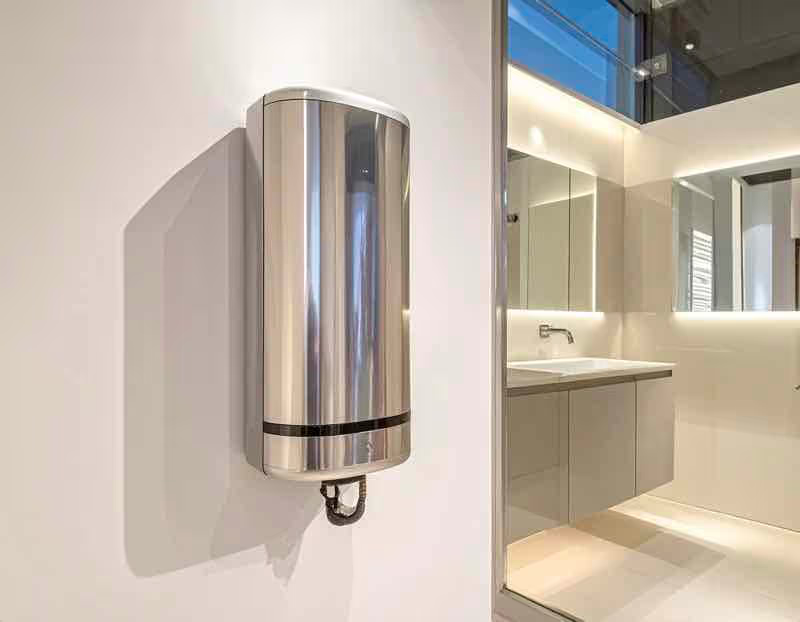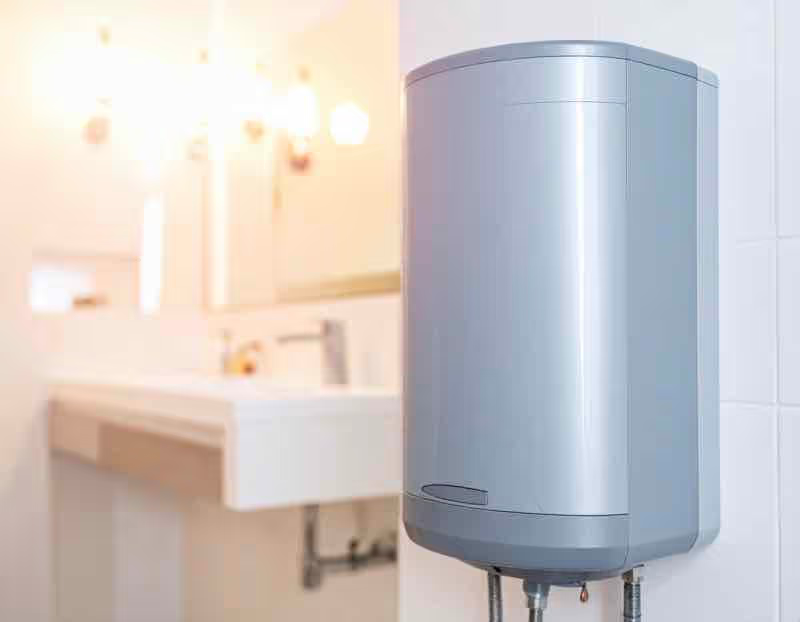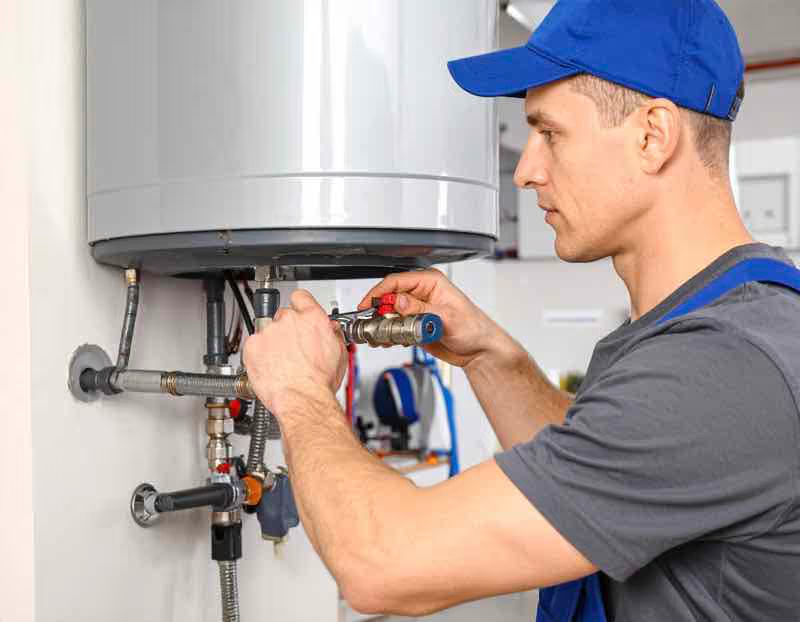Tankless Water Heater Questions Answered: What Orlando Homeowners Need to Know Before Switching
Answers to common tankless water heater questions from Orlando plumbers. Learn about costs, electrical requirements, performance, and installation before you switch.
Free Estimate

A customer called us last month asking if a tankless water heater would work during Florida's hurricane season power outages. Great question—and one of a dozen we hear every week from Orlando homeowners considering the switch.
This guide answers the most common tankless water heater questions we hear from Central Florida homeowners. You can decide if going tankless is the right move for your home and budget.
We'll cover how tankless systems compare to traditional tanks and what the real costs look like. You'll learn whether your electrical setup can handle it and what to expect during water heater installation in Orlando—all from a plumber's perspective.
What is the downside of a tankless water heater?
The main downsides of tankless water heaters are higher upfront costs and potential electrical upgrades. Installation typically runs $1,800–$4,500 in Orlando—roughly double what you'd pay for a traditional tank—because most homes need electrical panel upgrades to handle the 120–150 amp load.
Other considerations include:
- Limited simultaneous use: Running multiple showers or appliances at once can overwhelm smaller units
- No hot water during power outages (unlike gas tanks with pilot lights)
- Longer wait for hot water in homes with plumbing far from the unit
- Higher repair costs due to specialized components
However, these downsides are offset by 20–30% energy savings and a 20-year lifespan versus 10–12 years for tanks.
Not sure if your home is ready for tankless? Get a free assessment from our Orlando plumbers to see what upgrades you'd actually need.
How Tankless Water Heaters Compare to Traditional Tanks
Tankless water heaters heat water on demand instead of storing 40–50 gallons in a tank. When you turn on a faucet, cold water flows through the unit and gets heated instantly by electric coils or a gas burner.
This design saves space. Tankless units mount on walls and take up about as much room as a suitcase. Traditional tanks stand five feet tall and take up valuable garage or closet space.
Energy efficiency is where tankless systems shine. They only heat water when you need it. Traditional tanks keep water hot 24/7, even while you sleep or work. That constant heating adds up on your electric bill.
Tankless units last 20 years or more with proper maintenance. Traditional tanks typically need replacement after 10–12 years. Orlando's hard water can shorten both lifespans, but tankless systems handle mineral buildup better.
The switch isn't always straightforward. Most Orlando homes need electrical panel upgrades to support tankless units. Some homes require new gas lines or updated venting systems. We evaluate your existing setup before recommending any changes.
Not sure where to start? Schedule a free tankless consultation in Orlando to discuss your specific setup.
Real Costs: Installation, Electrical Upgrades, and Long-Term Savings

Installation costs in Orlando range from $1,800 to $4,500 depending on unit size and electrical work needed. That's roughly double what you'd pay for a traditional tank replacement.
Most homes need a 200-amp electrical panel upgrade. This adds $1,000 to $2,500 to your total project cost. Older homes built before 2005 almost always need this upgrade. Newer construction often has the electrical capacity already in place.
Here's what you're paying for:
- Tankless unit: $800–$1,500
- Labor and installation: $500–$1,200
- Electrical panel upgrade: $1,000–$2,500
- Permits and inspection: $200–$300
Monthly energy savings average $20 to $40 for typical Orlando households. Your actual savings depend on hot water usage and current energy rates. Families who use a lot of hot water see bigger savings.
The payback period runs 6 to 12 years. Factor in the longer lifespan and you break even well before replacement time. Traditional tanks need replacement twice in the time one tankless unit lasts.
In our installs last year, about 60% of Orlando homes built before 2005 needed panel upgrades. Newer builds often have the capacity already.
Will a Tankless Water Heater Work for Your Home? (Technical Feasibility)
You can replace a 40-gallon tank with a tankless system, but sizing matters. Whole-house units need to supply 6 to 8 gallons per minute for simultaneous use. Running two showers and a dishwasher at once requires adequate flow rate.
Electric tankless systems require 150-amp electrical service minimum. Most units draw 120 to 150 amps during operation. Your home's main breaker must handle this load without tripping. Gas models need proper venting to the outside and adequate gas line capacity.
Plumbing distance affects performance. The farther your fixtures are from the unit, the longer you wait for hot water. This doesn't change total hot water available—just the delay before it arrives.
Calculate your household flow rate by counting fixtures that might run simultaneously. Each shower uses 2 to 2.5 gallons per minute. Washing machines use 2 gallons per minute. Dishwashers use 1 to 2 gallons per minute. Add these numbers during peak morning or evening hours.
We always do a load calculation during the quote. We check your electrical panel, measure hot water demand, and confirm your main breaker can handle the draw. This prevents surprises after installation begins.
Want a professional load calculation and honest recommendation? Call our Orlando team at (407) 307-1625 or request a quote online.
Performance Questions: Showers, Power Outages, and Daily Use

You can take long showers with a tankless system. These units supply endless hot water as long as you don't exceed the flow rate. A properly sized unit handles extended shower times without temperature drops.
Multiple fixtures are where sizing becomes critical. Smaller units under 4 gallons per minute struggle when two people shower simultaneously. Whole-house models rated at 6 to 8 gallons per minute handle multiple fixtures without issues.
Electric tankless systems won't work during power outages. Unlike gas tank heaters with standing pilot lights, electric units need power to operate. If you lose electricity during a storm, you lose hot water too.
Cold weather has minimal impact in Orlando. Our groundwater temperature stays around 70°F year-round. Northern climates deal with 40°F groundwater, which forces tankless units to work much harder. Florida's warm groundwater makes these systems more efficient here.
One customer asked if they'd lose hot water during hurricane season. Short answer: yes, unless you have a generator. We always recommend keeping a backup plan for extended outages.
Here's what works and what doesn't:
- Long showers: Yes, unlimited hot water
- Multiple showers at once: Yes, with properly sized whole-house unit
- Running dishwasher during shower: Depends on unit size
- Hot water during power outage: No, not with electric units
- Performance in Florida heat: Better than colder climates
What to Expect During Installation (and What Plumbers Really Think)
Typical installation takes 4 to 8 hours for straightforward jobs. Projects requiring electrical panel upgrades take 1 to 2 days. We coordinate with licensed electricians when panel work is needed.
Orlando requires permits for tankless installation. You need electrical and plumbing permits, plus a final inspection. We handle permit applications and schedule inspections as part of our service.
We consider several factors before recommending tankless systems. Household size matters—larger families need higher flow rates. Your budget determines whether upfront costs make sense. Existing electrical capacity affects total project cost. Hot water demand patterns show whether tankless fits your lifestyle.
Common installation challenges include tight electrical panel capacity and old plumbing that needs updating. Some homes lack adequate ventilation for gas units. Older homes sometimes have panels that can't be upgraded without major electrical work.
We turn down about 1 in 5 tankless requests. It's not because we don't want the work. Sometimes a homeowner's setup or usage pattern makes a high-efficiency tank a smarter fit. We'd rather recommend the right solution than sell you something that doesn't match your needs.
Here's how installation unfolds:
- Free quote and load calculation at your home
- Permit applications submitted to Orange County
- Electrical panel upgrade (if needed)
- Tankless unit installation and connection
- Final inspection and system testing
Ready to explore tankless options for your home? Our Orlando plumbers provide free quotes and transparent pricing—no surprises, no pressure. Contact us today or visit our Google Business Profile to see reviews from Central Florida homeowners who've made the switch.
Get a Free Quote!
Terms and Conditions
Request a Quote
Terms and Conditions
Request a Quote
Terms and Conditions

